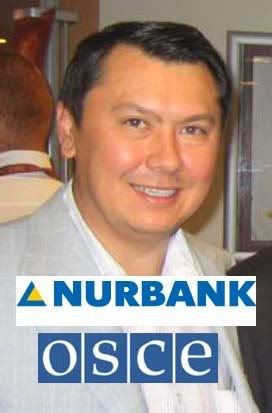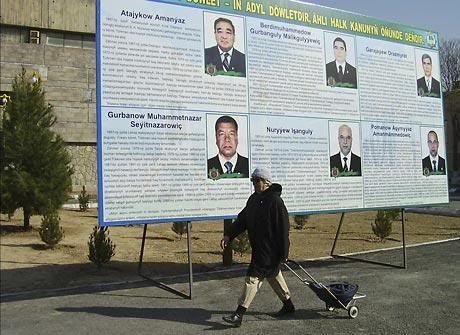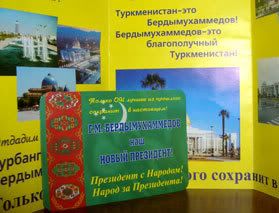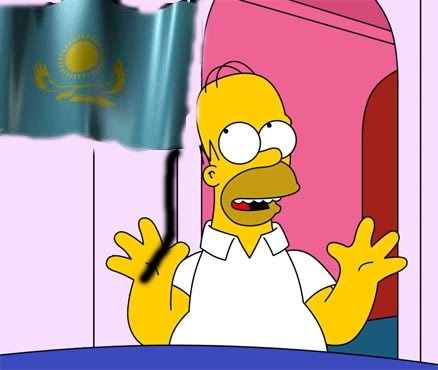
Rakhat Aliyev’s political and business career in Kazakhstan has been a blessed, albeit rocky, one. Marrying into the Nazarbayev family as the eldest son-in-law has obviously assisted Mr. Aliyev’s political rise and financial enrichment. He is alleged to control Nurbank, the Karavan media group, and numerous other critical assets. In addition, he has served in high-level governmental positions in the Committee for National Security (KNB) and the Ministry of Foreign Affairs. His wife, Dariga Nazarbayeva, has been a media tycoon, a political party leader, and is now a Deputy in parliament. This success in business and politics, however, has also been marred by almost continual scandal.
The most prominent of these scandals took place in 2001, when
Aliyev was accused of being behind a coup plot to remove his father-in-law Nursultan Nazarbayev from power. While the facts behind this alleged coup remain murky, it is well known that various members of the financial elite in Kazakhstan at the time, many of whom are friends of the president’s second son-in-law Timur Kulibayev, were upset with Aliyev’s allegedly cavalier business practices. In fact, it is often suggested that concern over the growing financial and political power of
Rakhat Aliyev was the original impetus for the creation of the Democratic Choice of Kazakhstan (DCK) in 2001. Thus, whether or not Aliyev planned an actual coup, there was little doubt that 2001 marked the public emergence of the competition between Aliyev and Kulibayev for the most privileged position in Kazakhstan’s elite, a struggle that continues to this day.
There are fantastic stories about Aliyev’s life being threatened at this time, complete with dramatic scenes of him begging before President Nazarbayev to forgive him. While such stories cannot be confirmed, it is widely believed that Aliyev was punished for his disloyalty in 2001 by being exiled as Ambassador to Austria and the OSCE in Vienna. He remained in this position until 2005 when he returned shortly before the presidential election to take over the position of Deputy Minister of Foreign Affairs.
Analysts speculated that
Nazarbayev had brought Aliyev back to Kazakhstan in 2005 to access his allegedly infamous skills of intimidation during the run-up to the election. When Aliyev returned to Kazakhstan, it seemed that he and his wife Dariga were on the rise politically. Dariga’s Asar party had become a fixture in Kazakhstan’s political arena, and she had become a vocal member of parliament. She even accompanied her father on visits to important foreign states, and rumors were rampant that
she was in line to be her father’s successor. But such success was not to last for long.
Scandal returned to Rakhat and Dariga in connection with the murder of Altynbek Sarsenbayev last February. Although the
mystery behind Sarsenbayev’s killing remains unsolved, rumors were rampant that Rakhat was somehow involved. After
a retired KNB officer went public with claims that Rakhat had been involved in the killing, Aliyev took him to court, and Dariga wrote her now infamous article
Déjà vu, where she claimed that the murder of Sarsenbayev was a conspiracy of people in government to defame her and her family and an attempt to repeat efforts from 2001 to discredit her husband.
Like the previous scandal of 2001, this one was “swept under the carpet.” It is assumed by many, however, that
the dissolution of the Asar party last summer was an act punishing Dariga for her “airing of dirty laundry” from the intra-elite and intra-family politics of Kazakhstan. Instead of punishing Rakhat in this instance, it seemed that the president took out his anger about the Sarsenbayev scandal on his long-time friend and crony Nurtai Abykayev, whose underling,
Yerzhan Utembayev, was eventually officially convicted of organizing Sarsenbayev’s killing. Utilizing a tried and true method of removing individuals from domestic politics,
Abykayev was recently removed as speaker of the Senate and sent to Moscow to become Kazakhstan’s Ambassador to Russia, a post that Sarsenbayev had ironically held before joining the opposition to Nazarbayev.
Just when it seemed that Rakhat Aliyev may have escaped the scandal of Sarsenbayev’s killing and its aftermath unscathed, Mr. Aliyev was once again implicated in a murky public scandal during the last several weeks involving his role in Nurbank. A former official from Nurbank had gone missing, and his wife openly accused Aliyev of being involved in his disappearance. The scene she described was reminiscent of other accusations against Aliyev from the past and included
Aliyev personally beating her husband and holding him hostage handcuffed at a “banya” in the foothills surrounding Almaty. In a series of bizarre events that followed,
Nurbank was raided by the Financial Police, and the former official of Nurbank was later
arrested and accused of financial misdeeds in relation to his work at the bank.
While it seemed that this scandal had also been take out of the public eye, it is interesting that Aliyev last week was suddenly
sent back to his position as Ambassador to Austria and the OSCE and removed from his post at the Ministry of Foreign Affairs in Astana. While Aliyev’s new appointment could be a coincidence, past practice and
rumors in Astana suggest that he is once again being exiled for scandalous behavior.
Aliyev’s reaction also reflects past behavior as he has begun a series of
defamation lawsuits against media outlets and the wife of the former bank official who had accused him of beating and kidnapping her husband. Yesterday, Aliyev also
gave an interview to Reuters apparently as part of a campaign to rehabilitate his reputation. Alas, it seems that the soap opera of Kazakhstan politics continues, and its main plot-line remains “all in the family.”
Rakhat Aliyev, however, has proven to be an extremely resilient political figure in Kazakhstan, and it is unlikely that people have seen the last of his involvement in domestic politics. Now, his biggest task is obtaining the chairmanship of the OSCE for Kazakhstan in 2009. If he succeeds, he will inevitably return as the prodigal son-in-law to domestic politics. If he doesn’t, which his many political foes inevitably hope for, he may have to wait it out in Vienna for some time to come. One has to wonder how aware
the various international parties who will be making decisions in Vienna are of this domestic “subtext” to Kazakhstan’s OSCE chairmanship bid.

















